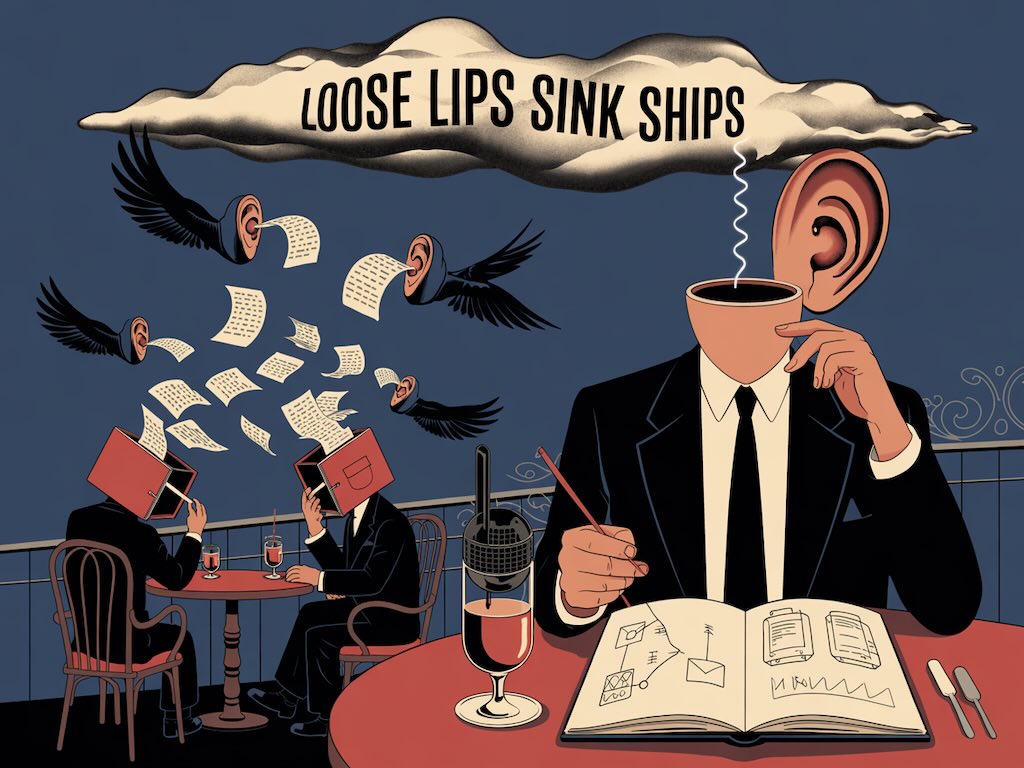
Electronic Eavesdropping Isn’t Your Biggest Threat
Today we are bombarded with so much media coverage about spying via satellites or high flying surveillance planes, it’s easy to assume that big brother’s eyes are always present…and everywhere. Moreover, we continuously hear about people’s personal information as well as companies’ confidential files routinely falling into the hands unscrupulous hackers. So, what are we to conclude?
Many believe we live in very scary times and simply assume their losses are a fait accompli. Some throw their hands up, accepting their fate, while others shrug it off, muttering a resigned c'est la vie.
Yet, despite it all, the real threats are, as the saying goes, hiding in plain sight.
Loss of critical information, up to and including business sensitive data that could bring the company down isn’t necessarily tied to high-tech loss at all. The more common ways have traditionally been, and continues to go unabated, in one or more of the following ways:
1. Loose Lips Sink Ships
A World War II-era warning still holds true today: what you say and where you say it matters.
Marketing professionals, sales reps, and executives love to talk about their company’s successes. But sometimes, enthusiasm leads to unintentional oversharing. A seemingly innocent conversation at a conference, social event, or even on a business call can expose proprietary information to the wrong ears.
2. Trade Shows & Conventions: A Spy’s Playground
Industry events are gold mines for corporate espionage.
Professional “information gatherers”, competitors, and media professionals routinely attend trade shows—not just for networking but to pick up valuable insights from unsuspecting employees. A simple offhand comment or casual boast can be collected, analyzed, and weaponized against your company.
3. Off-Site Meetings: A Security Nightmare
Meeting at a hotel, café, or conference center? Be mindful of what you leave behind.
A corporate spy doesn’t need sophisticated equipment to steal information. A discarded meeting agenda, handwritten notes, or even napkin scribbles from a brainstorming session can be a treasure trove for someone looking to gain an advantage.
4. Public Transportation: A First-Class Ticket to Leaks
Picture this: three marketing reps board a flight home after a successful client pitch. Excited, they loudly discuss details of the deal, oblivious to their surroundings.
Seated nearby? The general auditor of their competitor.
How long do you think it took before their competition crafted a counteroffer—all thanks to an unguarded conversation on a plane?
5. Restaurants: Your Favorite Table Might Be a Trap
You know that cozy corner table at your go-to lunch spot? The one where you feel comfortable enough to discuss business openly?
Well, guess what—you’re not alone.
Restaurants are prime hunting grounds for competitors, journalists, and anyone looking to overhear sensitive discussions. A casual business lunch could easily turn into an information gold rush for the wrong person.
6. The Danger of Outbound Communication
Sales letters, emails, and even seemingly harmless phone calls can be fertile ground for data leaks.
- An ill-timed promotional letter can tip off competitors before a major product launch.
- A phone call from someone claiming to be a researcher or pollster might actually be a social engineering tactic designed to extract sensitive company details.
Being mindful of who you’re talking to and what you’re disclosing can prevent critical information from slipping through the cracks.
7. Sharing with Friends & Family: A Slippery Slope
Family, friends, and significant others love to hear about your work. It’s natural—they’re proud of you.
But when you answer the question "So, what exciting things are you working on?", you may unknowingly be setting a chain reaction in motion.
Even with no ill intent, once you share information, you lose control over where it goes next. They might innocently mention it to someone else, who then shares it further—until your company’s best-kept secret isn’t so secret anymore.
8. Executive Bragging: The Most Costly Overshare
Executives hold the keys to some of a company’s most sensitive information—but do they always treat it that way?
Whether at a neighborhood gathering, formal gala, or their golf club, high-ranking professionals can unknowingly disclose valuable information through casual bragging. Even with signed non-disclosure agreements, social settings make it easy to slip up.
The Real Threat: Human Error, Not High-Tech Surveillance
Yes, cyber threats and electronic espionage are very real concerns. Sophisticated hacking and surveillance technologies pose significant risks, but many of the biggest security breaches still come from human behavior.
Being mindful of where you speak, what you share, and how you communicate can mean the difference between protecting your company’s assets and handing them over to competitors.
The biggest leaks don’t always happen through sophisticated cyberattacks. Sometimes, all it takes is a loud conversation, a discarded document, or an innocent chat with a friend.


